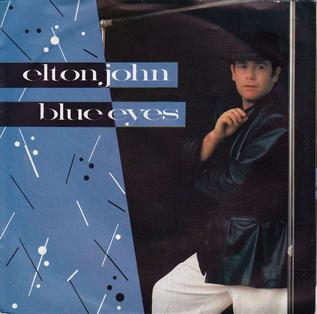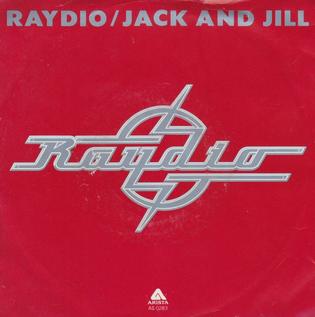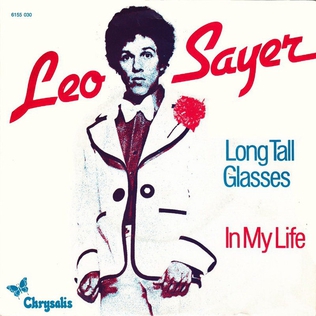
"You're in My Heart (The Final Acclaim)" is a song written and recorded by Rod Stewart for his 1977 album Foot Loose & Fancy Free. The song become a hit, reaching the top ten of many countries, including the United States (number 4), Canada (number 2), and Australia, peaking at number 1 for one week.

"Don't Give Up on Us" is a hit song recorded by American-British singer David Soul, and written by Tony Macaulay.

"Undercover Angel" is a song by singer-songwriter Alan O'Day. Released as a single in 1977, it was certified gold, having reached No. 1 on the Billboard Hot 100 and No. 9 on the Australian Singles Chart.

"Baby, What a Big Surprise" is a ballad written by Chicago's then bassist/singer Peter Cetera, which appeared on their album Chicago XI (1977), with Cetera singing lead vocals. The first single released from the album reached number 4 on the US Billboard Hot 100 chart.

"Montego Bay" is a song co-written and performed by Bobby Bloom about the city in Jamaica of the same name. The song was a top ten hit for Bloom in the Fall of 1970 on both sides of the Atlantic. It reached No. 3 on the UK Singles Chart, No. 5 on the Canadian RPM 100 Singles Chart, No. 7 on the Australian Go-Set Singles Chart and No. 8 on the US Billboard Hot 100. The song was co-written and produced by Jeff Barry. In the master tape of the song, Bloom breaks into a chorus of "Oh, What a Beautiful Mornin'" at the end of the recording. The song features a whistler, as well as Jamaican instruments in a calypso style.

"Moody Blue" is a song made famous by Elvis Presley. The song was written by Mark James who recorded the original version of the song, which reached #15 in South Africa during the summer of 1976. James also penned Elvis' "Suspicious Minds".

"Only Yesterday" is a song recorded by the Carpenters. Released on March 14, 1975, the song was composed by Richard Carpenter and John Bettis. "Only Yesterday" peaked at number four on the Billboard Hot 100 and number one on the Adult Contemporary (AC) charts, The Carpenters' eleventh number one on that chart.

"Blue Eyes" is a song performed by English musician Elton John with music and lyrics written by John and Gary Osborne. It was released in 1982, as the UK lead single from John's 16th studio album, Jump Up! (1982). It was released as the album's second single in the US. It hit No. 8 in the UK; in the US, it spent three weeks at No. 10 on the Cash Box chart, went to No. 12 on the Billboard Hot 100, and spent two weeks at No. 1 on the Billboard AC chart. John performed this song often in his concerts until 2012.

"Whodunit", written by Keni St. Lewis and Freddie Perren, was a hit song for American R&B/disco group Tavares in 1977. Released from their album Love Storm.

"Never Gonna Fall in Love Again" is a song co-written and recorded by American pop rock artist Eric Carmen. It was released as the second single from Carmen's self-titled debut solo album and peaked at No.11 on the US Billboard Hot 100 chart in June 1976, remaining in the Top 40 for ten weeks. The song reached No.1 on the Billboard Easy Listening chart. In Canada, it was a hit at No. 1 on both charts.

"Don't Call Us, We'll Call You" is a hit song by the American rock band Sugarloaf. Co-written by lead vocalist Jerry Corbetta, the song was featured as the title track of the band's fourth and final album. It was their fourth single and was recorded at Applewood Studios in Golden, Colorado. Performing on the track, along with Jerry Corbetta, were session players Paul Humphries (drums), Max Bennett (bass), Ray Payne (guitar), and a group called the "Flying Saucers" on harmony vocals.

"Desirée" is a 1977 song written and recorded by Neil Diamond and included as a track on Diamond's 1977 album, I'm Glad You're Here with Me Tonight. The single peaked at number 16 on the Billboard Hot 100 and reached number one on the U.S. Easy Listening chart to become his fifth number one on that chart. The song likewise reached number one on the Canadian AC chart.

"Theme from The Greatest American Hero" is a song composed by Mike Post with lyrics by Stephen Geyer, and sung by American singer Joey Scarbury. It serves as the theme song for the 1980s television series The Greatest American Hero. The track was later included on Scarbury's 1981 debut album America's Greatest Hero.

"How You Gonna See Me Now" is a song written by Alice Cooper, Bernie Taupin, and Dick Wagner, performed by Cooper and produced by David Foster. It was released on Cooper’s album, From the Inside.

"You" is a 1977 single by Australian recording artist Marcia Hines, first recorded by writer Tom Snow on his 1975 Taking It All in Stride LP. "You" was the second single from her third studio album, Ladies and Gentlemen, released in October 1977. It peaked at No. 2 in Australia, and remains Hines' highest-charting single in Australia.

"Jack and Jill" is a 1977 hit song by R&B vocal group Raydio. It was the first single from their debut album Raydio, and became an international top 10 hit. It reached number eight on the U.S. Billboard Hot 100 and number six on the Cashbox Top 100. It reached number five in Canada, number four in Australia, and the top twenty in UK. It was the first of five U.S. top 10 singles by Ray Parker Jr. and/or Raydio.

"Really Wanna Know You" is a 1981 song by Gary Wright that was a hit single in the U.S., reaching No. 16 on the Billboard Hot 100. It was taken from the album The Right Place. The song spent 17 weeks on the chart and became Wright's third biggest U.S. hit. It was his final charting single.

"Long Tall Glasses (I Can Dance)" is a 1974 song by Leo Sayer, co-written with David Courtney. It was released in the United Kingdom in late 1974, becoming Sayer's third hit record on both the British and Irish singles charts and reaching number four in both nations. It was included on Sayer's album Just a Boy.

"The Other Guy" is a song by Australian soft rock band Little River Band. It was released in February 1983 as the third and final single from the band's 1982 Greatest Hits album. The song also introduced the band's new lead vocalist, John Farnham, who replaced Glenn Shorrock.

"Close Your Eyes" is a 1973 hit song recorded by Canadian trio Edward Bear. It was the lead single released from their fourth and final studio album, Close Your Eyes and was the biggest hit from the LP. The song was written by Larry Evoy, and was a sequel to their best-known hit, "Last Song".




















